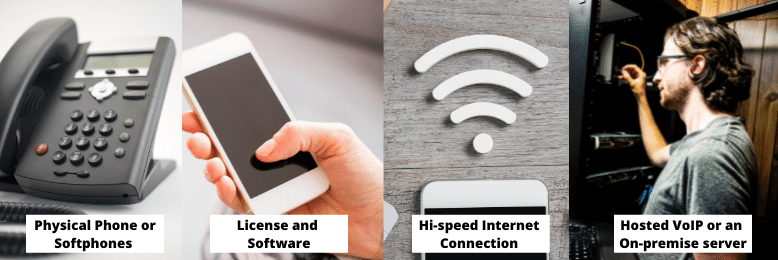What is VoIP? (& Do You Need It?)
October 15th, 2021 | 5 min. read

What is VoIP? Is this something your business needs? How does it work and will having a VoIP system help your business improve? Learn more about VoIP in this article and evaluate if VoIP is something you need for your company.

Are you struggling to keep up with all your customers’ calls? It may be time to find a more efficient phone system to handle all the questions and leads coming your way. Luckily, technology has evolved to the point where you can have efficient systems online, and this evolution of technology has resulted in the VoIP system.
Intelligent Technical Solutions (ITS), a Managed IT Service Provider (MSP), offers VoIP phone systems for business owners. But before they decide to use a VoIP system, they want to know if they really need it.
And thus, we wrote this article to help you out. We’ll be tackling the following common questions about VoIP:
- What is VoIP?
- What are the features of VoIP?
- What kind of business benefits the most with a VoIP system?
- When do you need to get VoIP?
By the end of this article, you’ll clearly understand what VoIP is and be able to check if you need a VoIP system for your business.
What is VoIP?

VoIP or Voice over Internet Protocol connects your calls through the internet instead of the copper wire in regular phone systems. It is a modern alternative/replacement to the older plain old telephone service or (POTS).
Essentially, if you’ve ever called someone over the internet - even through Facebook Messenger! - you’ve used VoIP.
How it works

VoIP services convert your voice into a digital signal that travels over the internet. If you call a regular phone number, the signal is converted to a standard telephone signal before reaching the destination.
Who you can call
Depending upon your service, you might be limited only to other subscribers to the service, or you may be able to call anyone who has a telephone number - including local, long-distance, mobile, and international numbers.
If you call someone who has a regular phone, that person does not need any special equipment to talk to you. Some VoIP services may also allow you to speak with more than one person at a time.
Parts of a VoIP system
For a VoIP system to work, you need to have the following components:
- The physical phones or softphones (or a combination of both!)
- The license and software for each phone
- An internet connection with fast speeds plus a backup internet for your VoIP
- A hosted VoIP or an on-premise server with your extensions configured
All these parts of a VoIP system need to be set up correctly, so you can use all the critical features of VoIP.
What are the features of VoIP?
Here’s a quick overview of features that you’ll get from a VoIP system:
 Integrated Call Platform
Integrated Call Platform
VoIP systems have an integrated call platform. You have a dashboard where you can get call reports with detailed information about inbound and outbound calls and manage your extensions remotely. This means it’ll be easy to scale your platform to a more significant number of people.
Because of this integration, you can also call directly from a computer, a particular VoIP phone, or a traditional phone connected to a special adapter. As long as you have an internet connection, you can use your VoIP service wirelessly.
And due to this flexibility, you can also choose what kind of equipment you need. You have the freedom to choose what kind of phones or handsets you want.
 New Voicemail Features
New Voicemail Features
VoIP systems come with new features for your voicemail. You can transfer your voicemail to your email inboxes/chat apps and listen while on the go. You can also transcribe voicemails and transfer them as text files to be read instead of heard.
There is also interactive voice recognition with certain VoIP systems, which can be helpful for business owners receiving a lot of calls.
 Call Routing
Call Routing
VoIP allows incoming calls to be distributed to employees according to variables like extension number, department, language preference, and availability.
You will also have a dashboard for a call queue to organize calls according to urgency. People can also be placed on hold for specific amounts of time in the order you want them to be in.
 Call Conferencing
Call Conferencing
Call conferencing has become even easier with VoIP systems. Once all your employees have an extension number, getting people to jump into a call will be even easier. You can even do this with people who are calling you.
 Lower international costs
Lower international costs
International calls have also become cheaper due to VoIP systems. When you call international numbers, the call is rerouted to a local network thus using local lines in the country you’re calling. This reduces the price significantly.
What kind of business benefits the most with a VoIP system?

VoIP has a lot of benefits for businesses. It’s great for small to medium-sized businesses looking to lower expenses for their telephone use while upgrading their system in the process.
Businesses that have distributed teams also benefit a lot from VoIP. Employees can work from any location, and communication lines will remain open and have the efficiency of a landline. This also allows companies to implement the BYOD (Bring Your Own Device) policy easier.
Related article: Why Switch to VoIP? A Complete Guide
What business doesn’t get a lot of benefits out of a VoIP system?
But VoIP isn’t fit for all companies. If, for example, your industry has specific regulatory and safety requirements about phone systems, you might be better off sticking to a landline phone. For example, elevators are required to have emergency lines linked into a traditional phone line.
Also, companies with extensive phone systems might find that cost efficiency can break down with all their employees - especially if everyone is working from the same location.
Therefore, companies should review their needs to see if it aligns with what a VoIP system can offer.
When do you need to get a VoIP system?

You need to get a VoIP system when you’re experiencing the following problems:
An overly expensive phone system
If you’re spending more than $1000 a month on your phones, it’s a better idea to shift to a VoIP setup. This way, you can avail of more features than you currently have for approximately the same price point.
Scaling problems due to team growth
If you’re expanding your team, the price of setting up new cabling and phone lines for a new office can be a hassle you don’t want to deal with. You can encounter common problems with cabling specifications or, acquiring new materials.
Insufficient needs for a remote setup
Traditional phones are not useful for a remote setup, due to the logistical headache of getting one phone network into different homes in different places. It might not even be possible for you to do that, especially if you have employees in another country.
Missing features that can’t keep up with company needs
When your company grows, can your system handle it? There may be times when you need more out of your phone line. Perhaps you need more call parking groups, a long call queue, or more extensions for one person.
Do you need a VoIP system?

All in all, VoIP (Voice over Internet Protocol) connects your calls through the internet instead of the copper wire in regular phone systems.
A VoIP system has an integrated call platform, robust voicemail features, and efficient call routing. It also provides easier call conferencing and has lower international call costs.
And this system will benefit your business if you meet most of the following criteria:
- A small to medium-sized business
- Employees working remotely
- Need a phone line that functions as a regular phone line but with more features
- Want a phone system that you can scale up easily
- Need a more cost-effective solution than a traditional landline
But even if you need a VoIP system, you still need to know how much it’ll cost your company to shift to a VoIP system. Read the article “How Much Does VoIP Cost? | 3 Major Prices to Consider” to learn more about the price of VoIP.
Kharmela Mindanao is a senior content writer for Intelligent Technical Solutions. She’s called Ella by her friends and likes yoga, literature, and mountain climbing. Her favorite book is Anxious People by Fredrik Backman. She creates art and poetry and is on a quest to find the best cheesecake.
Topics:
